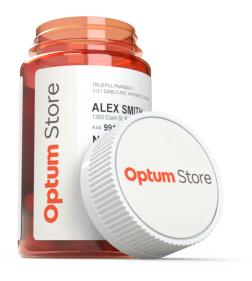
With prescriptions as low as $3 per month, you might be surprised at what you can save with the Optum Store.

Heart disease is the leading cause of death for both men and women in the US. We answer your questions about why it develops and how you can keep your heart healthy.
Table of Contents
Maybe you know someone who has heart disease. You might even be one of them. And it’s possible you don’t even realize it. That’s because some warning signs of heart disease, such as high blood pressure, don’t cause any symptoms.
Heart disease is serious. It is the leading cause of death in both men and women in the U.S.1
That’s a scary statistic, but it doesn’t mean your future heart health is completely out of your hands. It also doesn’t mean you can’t live a healthy and full life if you have heart disease already. You can make a big difference with good health habits like:
Also important? Knowing how the heart functions and the factors that raise your heart disease risk. We’re going to cover all of that more so you can help keep your heart as healthy as possible.
Your heart is basically a pump that has its own electrical system. This system helps it beat in a steady rhythm. And with each beat, the heart muscle squeezes and pushes blood out into the body. When it relaxes, more blood flows in.
The heart sits slightly on the left side of your body, between your lungs. It’s about the size of a fist and has four chambers. A series of valves separate the chambers. Valves are special flaps of tissue that help make sure blood flows in the right direction.
The heart pumps to all parts of your body. Arteries carry blood from the heart to the tissues. This blood includes oxygen and nutrients. Veins return carbon dioxide and other waste in the blood back to the heart.2
From there the blood goes to your lungs. When you breathe out, you get rid of the carbon dioxide. When you breathe in fresh air, oxygen gets pushed into the blood. Once it’s refreshed, blood moves back to the heart and the process begins all over again.
Several things must happen for blood to be delivered and returned properly. “The heart needs to send the right amount of blood to the tissues. It also needs to do this at the correct rate,” says Louis Gleckel, MD. He is an internist and cardiologist (heart doctor) at Lake Success Cardiology and Internal Medicine, part of Optum, in New Hyde Park, NY. “It also must make sure you get more blood when you need it. For example, when you’re exercising.”
This is where your heart rate comes in. Your heart rate (pulse) is simply the number of times your heart beats in a minute (bpm). When you’re resting, it should be somewhere between 60 bpm and 100 bpm.3 People who are very fit may have lower rates.
When you’re active, your body needs more oxygen so your heart beats faster to get that blood moving to your muscles. Chemical signals from your body work with your heart’s built-in electric system. Together they control how fast and hard your heart beats.
This is no small task. The heart beats 100,000 times a day and pumps about 2,000 gallons of blood throughout the body.4
Almost everything that’s good for your health overall is good for your heart. If you’re already doing a lot of them, great. But if you’re not, pick one thing to focus on at a time.
Quit smoking. Chemicals in tobacco can damage the heart and blood vessels. Smoking also reduces the level of oxygen in your blood. This forces the heart to work harder to deliver enough oxygen to your tissues. Over time, that could weaken its ability to pump well. Talk to your doctor if you need help quitting.
Exercise regularly. It will get your heart rate up and help your heart muscle get stronger. It can pump blood more easily into the lungs and the rest of the body. That means more oxygen gets to all your tissues. It also widens your blood vessels so they can deliver more nutrients and remove more waste.
Plus, being active can keep certain conditions that can harm your heart in check. It can lower your blood pressure and cholesterol. (Cholesterol is a type of fat.) It can also help you lose weight. See below for more.
Aim to get at least 150 minutes of moderate-intensity activity each week. That’s about 30 minutes five days a week. “Moderate intensity” means you can talk but not sing. Examples include walking, dancing or even yard work.
Or you can do 75 minutes of higher-intensity activity every week.5 Examples are running and jumping rope. “High intensity” means you can’t get more than a few words out at a time.
Eat healthy. What’s good for your heart? Good-for-you options like:
These foods are high in vitamins. They’ll help you keep a healthy weight and lower your cholesterol. They’ll also lower your chances of having heart problems.
Try to stay away from highly processed foods. They often contain:
Get to a healthy weight. When you’re overweight or obese, your heart has to work harder to pump blood. That can increase your risk of high blood pressure. Extra weight can raise your fat and blood sugar levels. This can lead to high cholesterol and type 2 diabetes.9, 10
Manage your stress. This is important not so much because stress directly harms the heart. Instead, chronic stress can lead to unhealthy habits. You may try to calm yourself by eating high-fat comfort foods, overeating or smoking. You might skip workouts.
So do your best to find ways to relax every day. Try yoga, deep breathing exercises and meditation. Do a hobby you love (like reading, sewing, bird watching). Spending quality time with family and friends can also help you feel calm.
Log enough sleep. Sleep is vital to your heart health. Why? During normal sleep, your blood pressure goes down. When you have sleep problems, your blood pressure stays higher for longer.6 This is another reason to pay attention to your stress levels. When you’re full of worries, it can be harder to get the sleep you need.
Get regular health screenings. These important checkups can help you and your doctor find potential heart problems early. The sooner you know, the sooner you can take steps to care for them. During an exam, your doctor will check your blood pressure, cholesterol levels and blood sugar levels. Depending on the readings, your doctor may prescribe medications. They also may suggest getting certain health tests earlier or more often. Keep reading to learn more about how these conditions impact your heart health.
Shop for blood pressure monitors and other health essentials at the Optum Store, and have products shipped directly to your front door.
Heart disease refers to a range of conditions that affect your heart. These include blood vessel diseases, heart rhythm problems, heart valve issues and more.
The most common cause of heart disease in the US. is coronary artery disease.7 It happens when plaque builds up in your artery walls. Over time, it can narrow or block the arteries. This can lead to a heart attack.
There are numerous factors that increase your risk of heart disease. You can change some of them. Others you cannot control.
You can’t change your:
You can change your:
Learn the signs that you could have a serious heart problem. Getting medical help right away is important if you think you’re having a heart attack or a stroke. Here are important problems to be aware of:
Heart attack symptoms can come on suddenly or slowly. “The severity of your symptoms doesn’t always match the severity of the heart attack,” Dr. Gleckel says. “The heart can suffer a lot of damage if you wait to get help.”
Symptoms of a heart attack include:
Here’s an easy way to remember the signs of a stroke. Think of the letters F.A.S.T. The letters stand for:
Other symptoms of a stroke in both men and women include:
An arrhythmia is a problem with the rate or rhythm of your heartbeat. Your heart may beat:
How does it feel to have an arrhythmia? Some people feel dizzy or faint. Or you may notice heart palpitations. Your heart feels like it is fluttering, pounding or beating too hard or too fast.11
This term means your heart is not pumping as well as it should be. Heart failure can happen slowly over time. Some signs include:
You may need to change how you eat and exercise. You may need to take medicines. Some people may also need an operation. Talk to your doctor to decide on the best treatment for the type of heart disease you have.
Taking care of your heart is one of the best gifts you can give yourself. Don’t worry about changing everything in your life all once. Just focus on trying one new heart-healthy habit at a time. When that becomes easy, move on to the next one. Soon enough, you’ll have a whole set of healthier habits to rely on.

With prescriptions as low as $3 per month, you might be surprised at what you can save with the Optum Store.